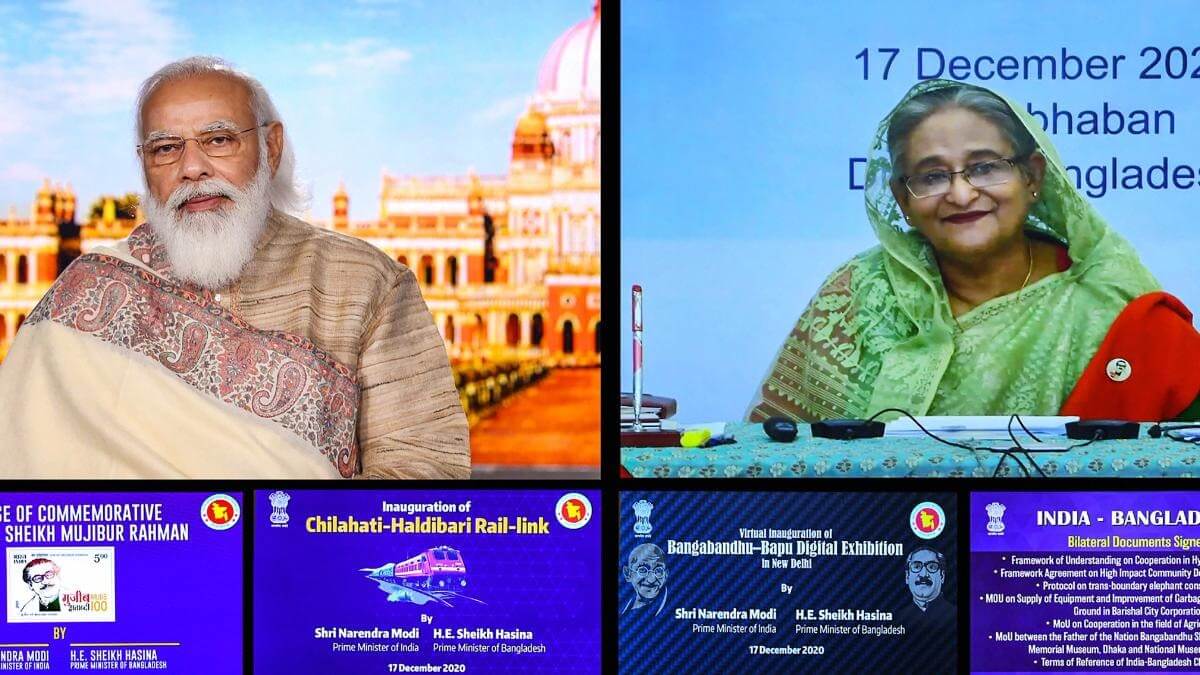On Thursday, Indian Prime Minister Narendra Modi held a virtual discussion with his Bangladeshi counterpart, Sheikh Hasina. This comes as India continues to reiterate its commitment to its “Neighbourhood First” policy, with its repeated insistence that Bangladesh is a significant partner in this vision. As a result of the discussions, the two sides materialised seven pacts on several issues, including agriculture, hydrocarbon and the supply of equipment and technology. Border security, cultural cooperation, and partnering to combat the COVID-19 pandemic were also issues that featured in the discussion.
One of the key focuses of the summit was the bolstering of rail, air, and road connectivity between the two neighbouring countries. The two leaders discussed their desire to revamp inter-state road connectivity. Previously, India and Bangladesh, along with Nepal and Bhutan signed the Motor Vehicles Agreement (BBIN-MVA), which was formed to regulate transit traffic between the four countries. However, after Bhutan decided to opt out of the agreement and only participate in the discussions as an observer, the implementation of the agreement was halted. During Thursday’s discussions, both the leaders agreed to work towards the operationalisation of the agreement. Hasina and Modi also confirmed the operationalisation of an air bubble to allow air travel for medical purposes.
The two sides held elaborate discussions on bolstering rail connectivity between India and Bangladesh and bringing back the pre-1965 rail links. Currently, only four out of the six are functional. Out of the remaining two, the Chilahati-Haldibari route was jointly inaugurated by the two leaders at the end of the summit. Further, the Karimganj-Mahisashan rail link will be operationalised by 2022. They also confirmed the establishment of the Akhaura-Agartala rail link, which is set to be functional by 2021.
Boosting connectivity between the two countries had been on the two leaders’ agenda for some time now. In pursuance of this, in July this year, the Narendra Modi government provided Bangladesh with 10 broad gauge locomotives. Further, in the same month, trade activities from the Chattogram Port to Bangladesh were also initiated.
During Thursday’s summit, the two premiers also discussed expanding the connectivity of inland waterways, which is guided by the 1972 Protocol on Inland Water Transit and Trade. Consequently, India and Bangladesh added two new waterway routes—Sonamura-Daudkandi and Daudkandi-Sonamura. Consequently, as per the joint statement released following the summit, the two leaders agreed to expedite the conclusion of the “Framework of Interim Agreement on sharing of waters of six joint rivers, namely, Manu, Muhuri, Khowai, Gumti, Dharla and Dudhkumar.”
However, some sticky issues continue to exist between the two countries. For example, Hasina brought up the issue of the Teesta water-sharing dispute and urged her Indian counterpart to resolve the issue expeditiously. The joint statement said, “Prime Minister Sheikh Hasina highlighted the need for early signing of an interim agreement for sharing of the Teesta waters, as agreed upon by both the governments in 2011. Prime Minister Narendra Modi reiterated India’s sincere commitment and continued efforts of the Government of India in that regard.”
Apart from their discussions on bolstering connectivity, the two also spoke of expanding their economic partnership as Bangladesh looks to graduate from its status as a least-developed country by 2024. Consequently, they are looking to cooperate in the areas of Information, Communication and Technology (ICT), and Artificial Intelligence. This is particularly significant for both countries, as Bangladesh is India’s largest trading partner in South Asia.
India’s relations with Bangladesh have seen some difficulties over the past year. The problems crystallised following the adoption of the Citizenship (Amendment) Act (CAA) and the National Register of Citizens (NRC) in 2019. India has, however, attempted to revive its positive relations with Bangladesh. The first indication of this was the relief grants offered to Bangladesh to assist them in fighting the COVID-19 outbreak. Moreover, the two have also increased cooperation and collaboration by setting up mechanisms to monitor the development of bilateral projects.
India, Bangladesh Look to Boost Ties, Sign Seven Pacts
During a virtual meet between Indian Prime Minister Narendra Modi and his Bangladeshi counterpart, the two leaders agreed to bolster cooperation on several fronts, including improved connectivity.
December 18, 2020

SOURCE: INDIA TODAY
